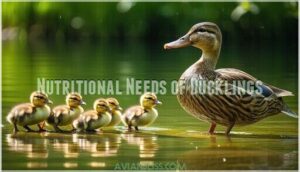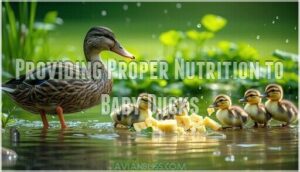This site is supported by our readers. We may earn a commission, at no cost to you, if you purchase through links.

Instead, they’re brilliant teachers who use a two-phase approach. During the first two weeks, mama duck provides regurgitated food packed with proteins—think of it as nature’s baby formula delivered beak-to-beak.
She’ll bring up partially digested insects and small fish that give her ducklings the nutritional boost they need for rapid growth. But here’s where it gets interesting: she simultaneously leads them to prime feeding spots, demonstrating essential foraging techniques like pecking at bugs and stirring up mud to reveal hidden treats.
This isn’t just about filling tiny bellies—it’s survival school in action, with lessons that determine whether these fuzzy students will thrive independently.
Table Of Contents
- Key Takeaways
- How Does a Mother Duck Feed Her Ducklings?
- What Do Ducks Feed Their Ducklings?
- Do Baby Ducks Feed Themselves?
- Feeding Method for Ducks
- Nutritional Needs of Ducklings
- Providing Proper Nutrition to Baby Ducks
- Tips for Feeding Healthy Ducklings
- Monitoring Ducklings’ Food and Water Intake
- Shelter and Environmental Needs for Ducklings
- Signs of Distress and When to Seek Veterinary Attention
- Frequently Asked Questions (FAQs)
- How long does a mother duck stay with her ducklings?
- How do ducks take care of their ducklings?
- Do baby ducks feed themselves?
- What is the feeding method for ducks?
- How long do mother ducks feed their ducklings?
- What is the role of regurgitation in feeding ducklings?
- When do ducklings become independent in finding food?
- Do all duck species feed their ducklings in the same way?
- When do ducklings stop following their mother?
- How long can ducklings survive without food?
- Conclusion
Key Takeaways
- You’ll see mother ducks use a two-phase teaching approach – they provide regurgitated, protein-rich food during the first two weeks while simultaneously demonstrating essential foraging techniques like pecking at insects and stirring up mud.
- Your ducklings don’t get spoon-fed like you’d expect – instead of direct feeding, mother ducks lead their babies to prime feeding spots where the young ones learn to find food independently through observation and imitation.
- You’ll notice ducklings become self-sufficient feeders within 24 hours – these precocial birds instinctively start pecking at insects and aquatic plants immediately after hatching, though they still benefit from mom’s guidance and protection.
- You’ll observe the feeding relationship lasts 10-12 weeks total – mothers gradually shift from providing regurgitated meals to teaching advanced foraging skills before the ducklings achieve complete feeding independence.
How Does a Mother Duck Feed Her Ducklings?
Unlike many bird species, a mother duck doesn’t directly feed her ducklings.
Instead, she employs sophisticated maternal foraging techniques, leading her offspring to prime feeding locations where they learn through imitation learning.
The mother demonstrates essential foraging behaviors—pecking at insects, stirring mud to expose worms, and filtering water for small crustaceans.
During the first two weeks, regurgitation provides vital nutrition, delivering partially digested food rich in proteins.
This regurgitation benefits rapid growth while ducklings observe feeding techniques.
Through careful observation, young birds master dabbling, surface pecking, and underwater diving.
Ducklings also develop a strong bond through instinctual imprinting behavior.
Feeding safety remains paramount as mothers position themselves strategically, scanning for predators while offspring forage independently.
This diet shift from regurgitated meals to self-sufficient feeding typically occurs between weeks two and four, establishing lifelong survival skills through maternal guidance rather than direct provision.
What Do Ducks Feed Their Ducklings?
Mother ducks don’t actually feed their ducklings directly—instead, they lead them to nature’s buffet. Duckling feeding revolves around discovering protein sources like aquatic insects, larvae, and small invertebrates that pack the nutritional punch growing birds need.
During their first weeks, duckling diet includes regurgitated food from mom, providing essential nutrients in easily digestible form. As they mature, duckling food sources expand dramatically. You’ll spot them pecking at plant matter including duckweed, water lilies, and tender aquatic vegetation.
Duckling nutrition demands variety—insects like ants and flies deliver protein, while seeds and grains provide carbohydrates. Small fish, crustaceans, and worms round out their natural menu. Duckling feeding behavior involves constant learning through imitation, watching mom demonstrate proper foraging techniques.
However, owners should be aware that raw beans pose risks if given as treats. The shift happens gradually. Early dependence on maternal guidance shifts toward independent foraging, with protein comprising over 70% of their diet initially before incorporating more vegetation as digestive systems mature.
Do Baby Ducks Feed Themselves?
Baby ducks possess remarkable independent eating abilities that emerge immediately after hatching. These precocial birds demonstrate natural pecking behaviors within hours, targeting protein-rich insects and aquatic invertebrates that comprise up to 70% of their wild diet during early foraging periods.
From hatching to hunting—ducklings master survival skills within their first day of life
Ducklings exhibit sophisticated duckling feeding behavior through observational learning under maternal supervision. They instinctively recognize appropriate duckling food sources by watching their mother’s demonstrations, then apply these lessons independently.
This duckling foraging process involves:
- Natural pecking at surface insects, larvae, and small invertebrates
- Self-directed consumption of aquatic plants and duckweed
- Independent selection of protein-rich prey for ideal growth patterns
- Gradual incorporation of seeds and grains as digestive systems mature
The duckling diet shifts from starter feeds containing 20% protein to grower formulations by three weeks. Providing ducklings with unmedicated chick starter is essential for their first two weeks.
Independent eating capabilities develop rapidly, with ducklings achieving feeding autonomy within 24 hours post-hatch while benefiting from continued parental guidance and protection during foraging excursions.
Feeding Method for Ducks
In regards to feeding methods for ducks, success hinges on understanding their unique dietary needs.
Mother ducks employ synchronized feeding and foraging techniques to teach ducklings proper food recognition.
During diet shift periods, maternal guidance becomes vital as mothers demonstrate effective feeding strategies, including regurgitation for youngest offspring.
Ducklings should be fed a diet of waterfowl starter crumbs from day-old to three weeks.
| Feeding Stage | Method | Key Focus |
|---|---|---|
| 0-2 weeks | Regurgitation | Protein delivery |
| 2-4 weeks | Guided foraging | Food recognition |
| 4-8 weeks | Supervised hunting | Technique refinement |
| 8-12 weeks | Independent practice | Skill mastery |
| 12+ weeks | Full autonomy | Adult behaviors |
You’ll need shallow feeding containers to prevent drowning while encouraging natural dabbling behaviors.
Keep food fresh and properly sized—finely chopped vegetables work best.
The mother duck orchestrates group feeding sessions, stirring mud to expose insects while ducklings learn through imitation and social cues.
Nutritional Needs of Ducklings
During their first vital weeks, ducklings face demanding nutritional requirements that directly impact their survival and development. Understanding duckling nutrition needs becomes essential for proper care.
Proper nutrition during those critical first weeks determines whether ducklings thrive or merely survive
Protein Requirements stand as the cornerstone of duckling diet, demanding 20-22% protein content during initial weeks—substantially higher than adult ducks need. This elevated protein intake fuels their remarkable growth stages, where they can double their weight within days.
Commercial Feeds specifically formulated for waterfowl provide the most reliable nutrition source. These feeds incorporate precise vitamin supplements and mineral intake ratios that match duckling feeding habits perfectly.
Key nutritional priorities include:
- High-protein starter feeds that fuel explosive early growth
- Essential niacin levels preventing devastating leg deformities
- Balanced calcium content building strong, healthy bones
- Fresh water access enabling proper digestion and nutrient absorption
Duckling growth demands precise attention to feeding frequency—they’ll consume approximately 115 grams daily while developing. Their rapid metabolism requires constant fuel, making nutritional precision non-negotiable for healthy development. Meeting their species dietary needs is crucial for their overall health.
Providing Proper Nutrition to Baby Ducks
Feeding your ducklings properly sets the foundation for healthy health and ideal growth stages. Start with unmedicated chick starter feed containing 22% protein, which supports their rapid development during early weeks.
This commercial feed provides essential nutrients that wild ducklings would naturally obtain from their mother’s guidance. You’ll want to offer five small meals daily, gradually reducing frequency as they mature.
Their duckling feeding habits mirror wild behavior—they’ll enthusiastically consume floating treats and dabble in shallow water. Natural supplements like finely chopped dandelion greens, mashed banana, and small worms enhance their duckling diet beyond basic commercial feeds.
Water quality plays a critical role in duckling nutrition needs. Always provide clean, shallow water alongside food since ducklings naturally wet their feed while eating. This mimics their instinctive duckling feeding methods observed in nature.
Store feed in cool, dry locations to prevent spoilage. Watch their duckling food preferences emerge as they grow—younger birds favor protein-rich options while older ducklings gradually incorporate more plant matter.
Remember, proper nutrition during these vital weeks determines their long-term health and survival success. Providing a balanced diet that includes nutritious bird food is essential for the healthy development of baby birds.
Tips for Feeding Healthy Ducklings
Following proper duckling nutrition guidelines will set your little ones up for success.
Smart feeding practices mirror what mother ducks naturally provide in the wild.
- Age-appropriate feeding schedules: Start with high-protein starter feed (18-20%) for the first three weeks, then switch to grower feed (15-16%) as feathers develop.
- Water quality management: Provide shallow, clean water containers that prevent drowning while allowing easy access for drinking and food digestion.
- Food variety introduction: Supplement commercial feed with chopped greens, mealworms, and insects after two weeks to replicate natural foraging behaviors.
- Growth monitoring techniques: Feed small amounts frequently throughout the day, as ducklings’ fast metabolisms require constant nutrition for healthy development.
Understanding a healthy diet plan is essential for the well-being of birds and can be applied to other animals as well.
Monitoring Ducklings’ Food and Water Intake
Successful duckling nutrition monitoring requires tracking three key metrics daily.
Each duckling consumes approximately ½ cup of feed per day, with duckling feeding frequency ideally set at four meals to maintain steady nutrient balance.
You’ll want to weigh your ducklings every few days using a kitchen scale—sudden weight drops signal feeding issues before they become serious problems.
Water sources demand equal attention since ducklings drink about half a gallon weekly by seven days old.
Their hydration levels directly impact digestion, so make certain waterers allow full bill immersion while preventing swimming in early weeks.
Fresh water changes several times daily prevent contamination that could derail your duckling feeding schedule.
Food quality monitoring means inspecting feed for mold or spoilage before each meal.
High-protein starter feed (20-22% protein) with niacin supports proper growth when measured consistently.
Track any dietary changes alongside growth patterns—this data helps identify nutritional gaps early.
Understanding the importance of balanced bird diets is vital for ideal duckling development.
Keep detailed feeding logs recording intake amounts, frequency, and behavioral changes.
This systematic approach to duckling food and water accessibility guarantees healthy development while catching health concerns before they escalate.
Shelter and Environmental Needs for Ducklings
Beyond monitoring your ducklings’ intake, creating the right duckling environment becomes your next priority. Environmental enrichment starts with establishing proper nesting sites that mimic natural duck habitat needs.
Your duckling shelter should provide three key comfort zones:
- A warm brooding area with consistent brooder temperature between 90-95°F for newborns
- A shallow pool with excellent water quality for natural swimming behaviors
- Protected spaces where ducklings can retreat when feeling vulnerable
Pond safety requires water depth no greater than their leg height – ducklings can’t regulate body temperature like adults. Use non-slip surfaces around water areas to prevent injuries. Adequate ventilation prevents harmful moisture buildup while maintaining warmth.
Your duckling environment needs both sun and shade options. They’ll naturally move between warm and cool spots as needed. Soft bedding like straw protects developing feet from harsh surfaces. Wire flooring damages tender webbed feet and should be avoided.
This setup creates a mini-ecosystem where ducklings develop natural behaviors while staying safe and comfortable. Understanding instinctual imprinting is essential for providing the right care and environment for ducklings to thrive.
Signs of Distress and When to Seek Veterinary Attention
Monitoring your ducklings daily helps catch duckling distress before it becomes serious.
Watch for emergency signs like lethargy, reduced activity, or isolation from the group.
Duckling health problems often show up as loss of appetite, abnormal posture, or feeding issues where they refuse food entirely.
Health alerts include ruffled feathers, labored breathing, twisted neck movements, or persistent diarrhea.
These symptoms signal potential duckling health monitoring needs immediate attention.
Sudden spasmodic leg movements in ducklings under four weeks old can indicate viral hepatitis, requiring urgent veterinary care.
Environmental duckling stress from temperature changes or overcrowding also triggers health issues.
If you notice thick nasal discharge, swollen abdomen, or any duckling injury with visible bleeding, don’t wait.
Contact an avian veterinarian immediately.
When basic supportive care fails to improve your duckling’s condition within 24 hours, professional veterinary attention becomes necessary.
Early intervention often makes the difference between recovery and tragedy.
Recognizing respiratory distress is essential for providing timely and effective care to your ducklings.
Frequently Asked Questions (FAQs)
How long does a mother duck stay with her ducklings?
Mother ducks stay with their ducklings for approximately 50-60 days until fledging occurs.
You’ll observe this dedicated maternal period guarantees survival through teaching foraging techniques, providing protection from predators, and gradually moving offspring toward complete independence in natural habitats.
How do ducks take care of their ducklings?
Like smartphones before flip phones, ducks use sophisticated parenting strategies.
You’ll observe mothers demonstrating feeding techniques, leading ducklings to water sources, teaching predator avoidance, providing warmth through brooding, and offering vocal guidance throughout their development phases, which includes demonstrating feeding techniques.
Do baby ducks feed themselves?
Yes, baby ducks feed themselves under their mother’s watchful eye.
You’ll see them naturally pecking at insects, plants, and aquatic life, mimicking mom’s foraging techniques while she provides guidance and protection.
What is the feeding method for ducks?
Following nature’s ancient blueprint, you’ll find that duck feeding combines demonstration with independence.
Mothers lead ducklings to water sources, showing them dabbling techniques while ducklings naturally peck at insects, plants, and small fish they discover themselves, following their natural independence.
How long do mother ducks feed their ducklings?
You’ll find that mother ducks guide their ducklings for 10-12 weeks, gradually shifting from providing regurgitated food to teaching foraging skills before the young achieve complete independence.
What is the role of regurgitation in feeding ducklings?
Regurgitation serves as nature’s first nutritional lifeline—you’ll find mother ducks providing this predigested food exclusively during your ducklings’ first two weeks.
Delivering essential proteins and nutrients before they’re capable of independent foraging is crucial, and this is achieved through the regurgitation process, highlighting the importance of predigested food.
When do ducklings become independent in finding food?
You’ll notice ducklings becoming increasingly independent around 4-6 weeks old, shifting from maternal guidance to self-reliant foraging. They achieve full feeding independence by 10-12 weeks when weaning completes naturally.
Do all duck species feed their ducklings in the same way?
Most duck species share similar maternal feeding strategies, though you’ll notice variations in habitat preferences and specific techniques.
Dabbling ducks demonstrate surface feeding, while diving species teach underwater foraging methods to their young.
When do ducklings stop following their mother?
You’ll witness ducklings gradually breaking free from maternal dependence around 10-12 weeks of age.
They’ve mastered essential foraging skills by then, shifting from followers to independent adventurers ready for solo survival.
How long can ducklings survive without food?
You’ll find ducklings can survive only 24-48 hours without food after their first day of life.
Their rapid growth and high metabolism demand frequent feeding every few hours for proper development.
Conclusion
Understanding how a mother duck feeds her ducklings reveals nature’s sophisticated teaching system in action.
Like tiny apprentices following their master craftsperson, ducklings learn survival through observation and practice.
You’ve witnessed this remarkable dual approach—direct feeding combined with hands-on education—that guarantees successful independence.
From regurgitated proteins to foraging demonstrations, each feeding interaction builds essential skills.
When you observe this intricate process, you’re watching millions of years of evolutionary refinement create perfectly adapted waterfowl capable of thriving in aquatic environments with a sophisticated teaching system and through hands-on education.
- https://www.ducks.org/conservation/waterfowl-research-science/duckling-survival
- https://www.youtube.com/watch?v=vc3uzxtmoT0
- https://www.reddit.com/r/duck/comments/1hhljlc/ducklings_feed_question/
- https://www.fresheggsdaily.blog/2012/02/basic-duckling-care-raising-healthy.html
- https://pmc.ncbi.nlm.nih.gov/articles/PMC5773304/










